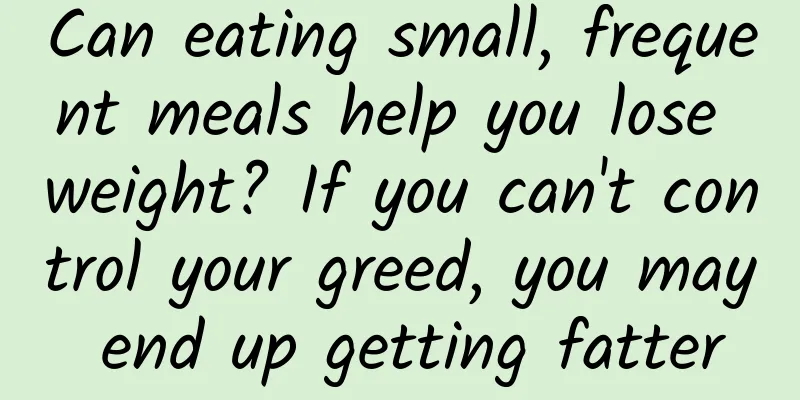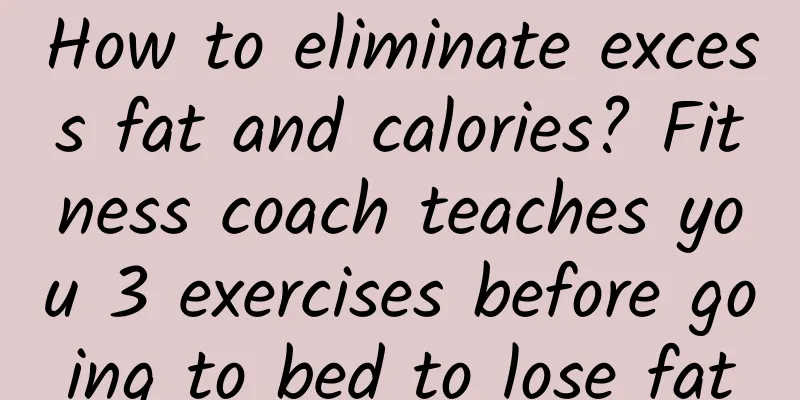Can eating small, frequent meals help you lose weight? If you can't control your greed, you may end up getting fatter

|
The saying "eating small and frequent meals helps lose weight" has been circulating in the weight loss circle for a long time, and people who are trying to lose weight have probably heard of it. However, eating every 2 hours and eating 6 light meals a day means eating anytime and anywhere. Does it really help to lose weight? Or is it just another over-hyped weight loss myth? What is the correct way to lose weight? Let’s hear what nutritionists say. Can eating small, frequent meals help you lose weight? Study: Doesn't help control appetite Many people advocate that "eating small and frequent meals can help lose weight." Nutritionist Sun Yuming said that a study published in the Journal of Nutrition showed that "eating small and frequent meals" cannot achieve the purpose of controlling appetite. In the experiment, the researchers divided foods with the same calories into two groups according to the frequency of eating. One group of subjects ate three meals a day, and the other group of subjects ate eight meals a day. After a period of time, the researchers tested the two groups of subjects on hunger, desire to eat, satiety, thirst and nausea. The results of the study found that there was no significant difference between the two groups in the above items. Therefore, the claim that “eating small meals frequently” helps control appetite cannot be supported by scientific experiments. "Eat small meals frequently" may turn your greed into "eat large meals frequently" and you may get fatter! Nutritionist Sun Yuming reminds us that although eating small and frequent meals cannot effectively control appetite, it can avoid overeating caused by excessive hunger and subsequent fat accumulation. However, it is particularly important to note that some people who eat small meals frequently to lose weight may not feel hungry temporarily after replenishing the calories in a small meal, but they may feel empty inside. If they cannot control the desire to eat at this time, they may accidentally turn it into a situation of "large meals frequently". The calorie intake will increase instead of decrease, which may put you in the dilemma of getting fatter the more you lose weight. Eating smaller, more frequent meals, reducing the amount of food in each meal and increasing the frequency of meals can help reduce the risk of excessive insulin secretion caused by a spike in blood sugar. The key to a successful weight loss plan is to have "calorie intake > expenditure" Nutritionist Sun Yuming reminds us that, in fact, the key to a protruding belly, a change from small elephant legs to large elephant legs, and a gradual expansion in size is "calorie intake > calorie consumption". It doesn't matter whether you eat "three meals a day" at regular times or "small meals frequently", the most important thing for losing weight is to control the total calories you eat every day. It takes 7,700 calories to burn off 1 kg of fat. Under the condition of not lowering the basal metabolic rate, it is recommended to reduce 500 calories from the daily calorie requirement when losing weight. Make sure to keep a calorie limit, eat a balanced diet, get enough sleep, and stay in a good mood every day. In addition, do proper exercise to increase the basal metabolic rate. Keep persisting, and I believe the perfect S curve will not be far away from you. (Source: National Health Administration) [Nutritionist's Tips]: Nutritionist Sun Yuming said that eating small and frequent meals to reduce the amount of food for each meal and increase the frequency of meals can help reduce the situation where blood sugar spikes lead to large amounts of insulin secretion. For diabetics who must control blood sugar, eating small and frequent meals is more suitable. |
<<: Do sugar-free drinks help you lose weight? Artificial sweeteners may make you crave more
>>: Stop smoking! Doctor: Not smoking in youth keeps you healthy
Recommend
Want to get better quickly from a cold? Nutritionist Su Yanchen urges: Don’t touch these 5 landmine foods
Cold is a common illness with symptoms including ...
What are the preventive measures for cervical erosion?
Among gynecological inflammations, cervical erosi...
Discussion: Does cervical hypertrophy affect pregnancy?
Does cervical hypertrophy affect pregnancy? This ...
Lower abdominal pain is a typical early symptom of adnexitis
Lower abdominal pain is a typical symptom of adne...
Symptoms and treatment of adnexitis
What are the symptoms and treatment of adnexitis?...
How can I get rid of the right ovarian cyst? What medicine should I take?
The treatment methods for eliminating right ovari...
What are the causes of irregular menstruation? How can women regulate irregular menstruation?
Irregular menstruation in women can be caused by ...
Air-frying makes food more delicious and oil-free cooking makes you lighter
Have you ever heard that food can be cooked using...
Symptoms and treatment of vulvar leukoplakia
The symptoms and treatment methods of vulvar leuk...
What are the causes of persistent dysmenorrhea in women?
What are the causes of persistent dysmenorrhea in...
How to treat primary cervical erosion, clinical treatment methods for cervical erosion
Cervical erosion is a relatively common disease. ...
What causes endometriosis to recur?
Endometriosis not only threatens women's phys...
Intermittent fasting helps you lose weight and KO civilization diseases!
Starving yourself to lose weight has always been ...
Does moderate cervical erosion require surgery?
Does moderate cervical erosion require surgery? W...
What is the best way to remove uterine fibroids? How to remove uterine fibroids
What is the best way to remove uterine fibroids? ...









